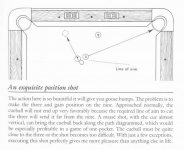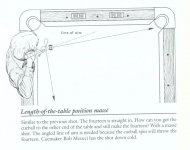You are using an out of date browser. It may not display this or other websites correctly.
You should upgrade or use an alternative browser.
You should upgrade or use an alternative browser.
Advanced "after contact" Masse' Position SHot
- Thread starter CJ Wiley
- Start date
As Grady would say........I cant wait for this to come up in a game. 
Thanks CJ
John
Thanks CJ
John
I can't see the video from work, but I actually have used this shot in games and tournaments from various positions. Useful when close to the ball and wrong sided on a side pocket shot, or when straight in at one end of the table and unable to create an angle to follow forward or draw back.
Not too bad to judge if close to the object ball, the farther away you are the more difficult to judge deflection, curve, etc.
I'll check out the video later!
Scott
Not too bad to judge if close to the object ball, the farther away you are the more difficult to judge deflection, curve, etc.
I'll check out the video later!
Scott
I can't see the video from work, but I actually have used this shot in games and tournaments from various positions. Useful when close to the ball and wrong sided on a side pocket shot, or when straight in at one end of the table and unable to create an angle to follow forward or draw back.
Not too bad to judge if close to the object ball, the farther away you are the more difficult to judge deflection, curve, etc.
I'll check out the video later!
Scott
Yes, it's very advanced to do it a foot or more away from the object ball.
Watch King James do it...at around the 24:00 mark...
http://www.youtube.com/watch?v=4maz6bcF3WQ
He didn't quite get enough of it to do what CJ showed, but the same idea...his actually went past an interfering ball before biting and turning...and you can see how it would come up quite often--more than one would think.
http://www.youtube.com/watch?v=4maz6bcF3WQ
He didn't quite get enough of it to do what CJ showed, but the same idea...his actually went past an interfering ball before biting and turning...and you can see how it would come up quite often--more than one would think.
Besides that shot, that is a great match too.
Watch King James do it...at around the 24:00 mark...
http://www.youtube.com/watch?v=4maz6bcF3WQ
He didn't quite get enough of it to do what CJ showed, but the same idea...his actually went past an interfering ball before biting and turning...and you can see how it would come up quite often--more than one would think.
."we only recognize what we're familiar with"
yes, it does come up if you know what to look for....especially in one pocket..."we only recognize what we're familiar with"
Besides that shot, that is a great match too.
yes, it does come up if you know what to look for....especially in one pocket..."we only recognize what we're familiar with"
Here is Bob Byrne's take on a short form of the shot. This is from his "Treasury of Trick Shots" book. Some people don't like "trick" shots. I think they have a lot to teach. Lou Butera used to do this shot in exhibitions where the situation was straight pool and the 9 ball was set up for a behind-the-rack break.


Yep, that lengthwise shot I've had to use before, and have hit it with the object ball a foot or so away. For that you don't have to elevate as much, more like a jump shot elevation, and just get the cue ball to hit square with the spin and it will make it up table no problem.
I have Mr. Byrne to thank for a lot of my early fundamentals and knowledge in both pool and then later 3 cushion. Wore out the cover and binding of the standard book and the others were equally as educational and entertaining. Great author and contributor to the sport, I hope he's doing well.
Scott
I have Mr. Byrne to thank for a lot of my early fundamentals and knowledge in both pool and then later 3 cushion. Wore out the cover and binding of the standard book and the others were equally as educational and entertaining. Great author and contributor to the sport, I hope he's doing well.
Scott
As Grady would say........I cant wait for this to come up in a game.
Thanks CJ
John
There are some examples of this same effect that are more common. Look at, for instance, the slightly-off-angle stop shot.
http://www.youtube.com/watch?v=UZAqHno_Kr4
Scott Frost demo's this shot somewhere in that Power One Pocket DVD - but doesn't say how to do it, the sneaky b*stard.Thanks for this post!
Scott does this shot in several different variations playing one pocket. I can make most of them, but my one pocket game isn't at Scott's level.
Glad you liked it. I will post more "specialty shots" in my new AZ section.
The difference between an amateur and a professional
That's useful and I would recommend always going "towards" a rail when shooting this shot. Of course this is something I would suggest as much as possible, and is more about "locating zones."
A great drill I use when preparing for a "game" is going an extra rail EVERY TIME. Buddy Hall told me how he calculated his Zones for position and simply illustrated "one is better than none, two is better than one and three is better than two." For pin point position it's best to either go to an extra rail or at least towards an exact spot on one.
This doesn't mean if you could "stop your ball" you should go one rail instead, it's just how to look for your biggest zone for maximum "margin of error." When looking for zones you complete the cue ball's "path line" to the rail or you can't see the potential "trouble spots."
This is best understood when you become completely familiar with the "natural" angles using a consistent "no side spin" cue ball.
Once you completely master the "no side-spin shot," then you are able to truly use it as a relative "index" for every situation. As you know exactly what hitting the cue ball slightly inside the vertical axis will do, you start to "real eyes" that you don't really "need" side spin.
Then {after this is experienced} you can use side spin because you want to, not because you think you "have to". I used to hate playing guys that did this because I knew it was going to take many hours to break them down mentally. Then it would just come down to an "endurance contest."
There are players that have played pool for many years that never learned they can hit {approximately}90% of the shots hitting the inside "quadrant" of the cue ball. The only time you have to cue it anywhere else is when you need to curve the cue ball or change the angle coming off a rail (and "throwing a bank", in certain situations). 'The Game is the Teacher'
There are some examples of this same effect that are more common. Look at, for instance, the slightly-off-angle stop shot.
http://www.youtube.com/watch?v=UZAqHno_Kr4
That's useful and I would recommend always going "towards" a rail when shooting this shot. Of course this is something I would suggest as much as possible, and is more about "locating zones."
A great drill I use when preparing for a "game" is going an extra rail EVERY TIME. Buddy Hall told me how he calculated his Zones for position and simply illustrated "one is better than none, two is better than one and three is better than two." For pin point position it's best to either go to an extra rail or at least towards an exact spot on one.
This doesn't mean if you could "stop your ball" you should go one rail instead, it's just how to look for your biggest zone for maximum "margin of error." When looking for zones you complete the cue ball's "path line" to the rail or you can't see the potential "trouble spots."
This is best understood when you become completely familiar with the "natural" angles using a consistent "no side spin" cue ball.
Once you completely master the "no side-spin shot," then you are able to truly use it as a relative "index" for every situation. As you know exactly what hitting the cue ball slightly inside the vertical axis will do, you start to "real eyes" that you don't really "need" side spin.
Then {after this is experienced} you can use side spin because you want to, not because you think you "have to". I used to hate playing guys that did this because I knew it was going to take many hours to break them down mentally. Then it would just come down to an "endurance contest."
There are players that have played pool for many years that never learned they can hit {approximately}90% of the shots hitting the inside "quadrant" of the cue ball. The only time you have to cue it anywhere else is when you need to curve the cue ball or change the angle coming off a rail (and "throwing a bank", in certain situations). 'The Game is the Teacher'
Last edited:
